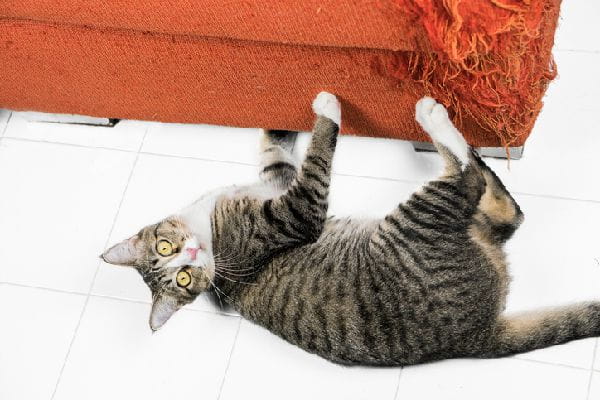
This section is about what can you put on the sofa to stop a cat from scratching it. There are a few different things that you can use to stop your cat from scratching the sofa.
Scratching posts are an obvious choice, but they often don’t work because cats don’t like them. Cats also prefer horizontal surfaces over vertical ones so putting a scratching post on the floor probably won’t work either. You could try putting something on top of the sofa to discourage your cat from scratching it, like aluminum foil or double sided tape.
How do you protect my couch from my cat scratching it?
If there’s a particular piece of furniture you want to get your cat to stop scratching, or to never start scratching in the first place, try covering the area with double-sided “sticky” tape, aluminum foil, or even cellophane. These are all surfaces that most cats don’t like the feel (or sound) of under their paws.[1]
What smell will deter cats from scratching furniture?
Cats dislike eucalyptus, lavender, lemongrass, and peppermint – just choose the ones you don’t mind the scent of yourself.[2]
What smell do cats hate?
As a general rule, cats are sensitive when it comes to smells, but there are a few scents they hate that might just surprise you. They can’t stand citrus and as much as you might love the smell of fresh herbs, cats hate rosemary and thyme. Banana and mustard are a big no-no too, as well as lavender and eucalyptus.[3]
What scent will keep cats away?
Orange and lemon peels (cats dislike citrus smells), cayenne pepper, coffee grounds, pipe tobacco, lavender oil, lemon grass oil, citronella oil, peppermint oil, eucalyptus oil, & mustard oil.[4]
What can you spray on furniture so cats don’t scratch it?
Nature’s Miracle No-Scratch Cat Deterrent Spray is an all natural formula that will not harm cats or people. This cat deterrent spray discourages cats from destructive scratching. Spray on furniture, carpet and curtains.[5]
Does vinegar stop cats from scratching?
First, dilute the vinegar in water using a 50/50 ratio. Next, spray a very small amount on any furniture that you cat is known scratch. The strong odor of the vinegar should deter them from scratching.[6]
What essential oil smell do cats hate?
In truth, cats are very sensitive to smell and are much more sensitive to smells and odors than humans. You can use this trait to your advantage to repel cats. Some of the scents that cats hate are lemon, grapefruit, orange, citrus, lavender, white vinegar, rosemary, thyme, peppermint, and pine.[7]
Why are cats afraid of cucumbers?
Intruder Alert Cats are hard-wired to be very territorial of their food, and for all they know, this cucumber may be poised to steal some kibble. A cat sees that cucumber is a threat, and when confronted with a “threatening situation,” explain PAWS Chicago, cats respond with fear and anxiety.[8]
Is vinegar toxic to cats?
While the smell of vinegar can be strong, it’s nothing like the chemical/perfume smell of many cleansers that will irritate my asthma. If you’re wondering if vinegar is safe for cats, the answer is yes, it is safe to use as a cleanser in cat households to clean everyday messes without dangerous chemicals.[9]
Is lavender toxic to cats?
Is lavender toxic to cats? Lavender is mildly toxic to cats, which means it’s not typically fatal. “The toxic compounds found in the pretty purple-flowered plant are called linalool and linalyl acetate, which cats’ livers are unable to process,” Dr. Conrad told The Dodo.[10]
How toxic is peppermint oil to cats?
Peppermint oil is highly toxic to cats. Without the enzymes required to break down phenols, cats exposed to peppermint oil can experience: Liver damage. Breathing difficulties. Wobbliness and seizures.[11]
Do cats hate vinegar?
Vinegar. Most cats hate the scent of vinegar, and it can be used as a safe deterrent just about anywhere. Vinegar smells strong to humans, but usually the scent tones down as it dries. Cats can still smell it, though, which makes it an effective deterrent.[12]
